Medical Device and Drug Disposal
Pills, patches and needles can pose unintended and potentially fatal threats if they aren’t disposed of properly. That’s why authorities created regulations for safe disposal of prescription drugs and medical devices.
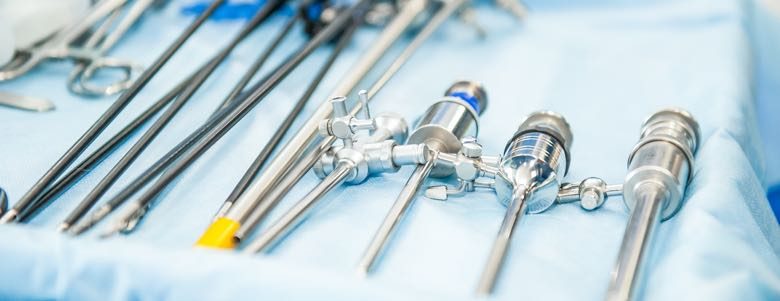
All expired, unwanted or unused drugs and devices, including over-the-counter medicines and prescription pills, liquids, patches, inhalers and injectable products, should be disposed of as quickly and securely as possible. The goal is to help reduce the chance of accidental or intentional exposure.
The U.S. Drug Enforcement Administration and the U.S. Food and Drug Administration provide guidelines and regulations for safe disposal of all unused medicines and potentially dangerous devices, such as syringes used to administer certain medicines.
- Harm to children, pets and others
- Accidental overdose
- Medicine cabinet mix-ups
- Abuse or misuse, especially by teens and young adults
- Harm to the environment, especially when disposed of improperly (i.e. pouring certain liquid medicines down the drain)
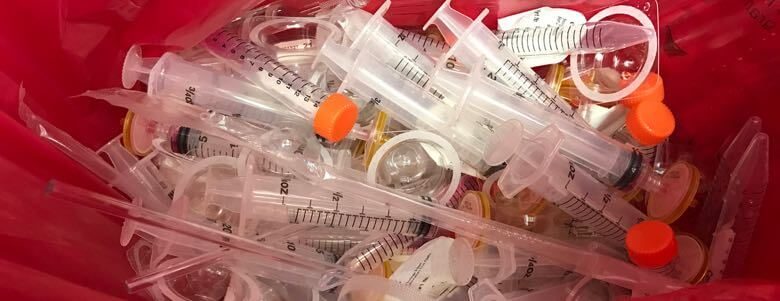
Drug Disposal Sites and Events
The DEA works with local governments and private entities to provide safe drug disposal opportunities for the public. You can find DEA-authorized collectors online.
Local governments and law enforcement agencies also participate in drug-disposal events. More than 4,400 local governments across the country participated in the DEA’s National Prescription Drug Take Back Day in April 2022.
The public dropped off nearly 442 tons of medications at 6,174 collection sites.
If a patient has questions regarding the safe disposal of a medication or device, they should contact their pharmacist. Local health departments can also assist with instructions for disposal or the retrieval of sharps disposal containers. The local waste management service may be able to answer questions about whether certain drugs or devices can be disposed of in a person’s household trash.
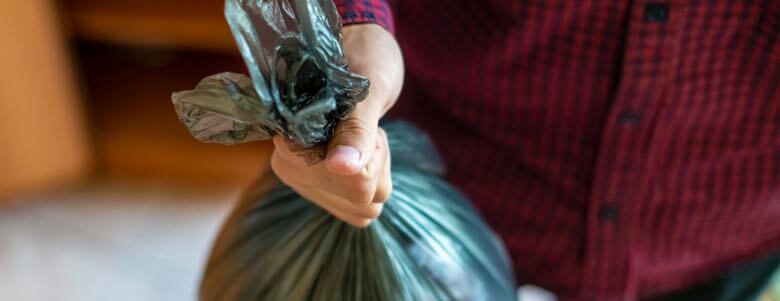
Steps for Household Trash Disposal
Most medicines, including prescription and over-the-counter drugs, pills, liquids, creams, etc., can be thrown into the household trash, unless otherwise specified on the label. To properly throw away used or expired medications, there are a few steps people should take:
- Step 1
- Mix any leftover medicines with an inedible substance such as dirt, kitty litter or used coffee grounds. The point is to make the mixture unappealing to both children and animals.
- Step 2
- Place the mixture in a closed container, such as a sealable plastic bag.
- Step 3
- Throw the container with the mixture into the household trash.
- Step 4
- Use a permanent marker to black out all personal information on the prescription labels of empty pill bottles or other medicine packaging. Then discard the materials.
Disposing of Inhaler Products
Inhalers and other aerosol products can be dangerous if they are punctured or thrown into a fire or incinerator during disposal.
Inhalers are portable devices that administer a type of drug that is to be breathed in. These products are often used by patients who have asthma or other breathing problems, such as chronic obstructive pulmonary disease (COPD).
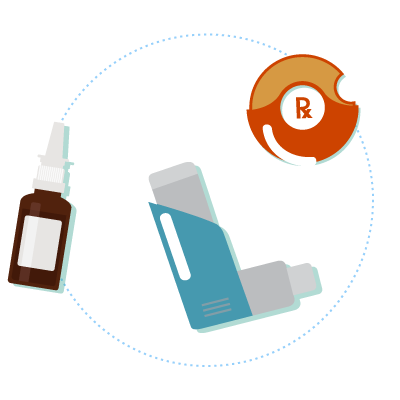
Common inhalers include:
- Short-acting bronchodilators, such as albuterol (brand names Proventil, ProAir and Ventolin)
- Long-acting beta agonists, such as salmeterol (brand name Serevent)
- Inhaled steroids, such as fluticasone and beclomethasone (brand names Flovent and Qvar)
- Combinations of long-acting beta agonists and steroids, such as fluticasone/salmeterol (brand name Advair)
When disposing of inhalers, people should read instructions on the labeling and follow local regulations and laws regarding the disposal of aerosol products. Most inhalers can be safely thrown into the household trash or recycled.
Disposing of Injectable Products
Unused or expired injectable products, such as those used to take insulin for diabetic patients, can be safely disposed of using a sharps disposal container. If you need assistance obtaining such a container, contacting the pharmacy that dispensed the injectable medicine is a good place to start.
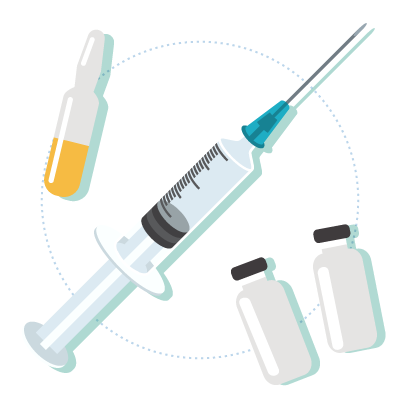
Injectable products include:
- Needles and pen needles
- Syringes
- Auto injectors and pens (pre-filled devices)
- Vials containing an injectable product
Short-, rapid-, intermediate- and long-acting insulin medicines, including Humulin, NovoLog, Novolin, Levemir, Lantus and Tresiba, are all injectable products that require safe disposal via a sharps disposal container.
- Fertility drugs (such as follicle stimulating hormone or FSH, Pregnyl, Novarel, Lupron and ganirelix)
- Testosterone (Depo-Testosterone)
- Growth hormone products (such as Genotropin, Humatrope, and Nutropin)
- Medications for rheumatoid arthritis (such as Humira, Simponi, and Enbrel)
- Drugs to prevent or treat blood clots (such as heparin, Lovenox)
- Incretin mimetics (such as Byetta, Victoza, and Trulicity)
Sharps Disposal Containers
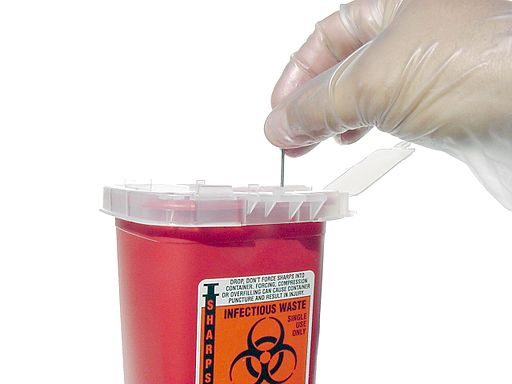
Sharps disposal containers should only be filled about three-quarters full before the container is disposed of. Sharps containers should never be overfilled. All injectable products should be safely and securely out of sight and out of immediate reach in a sharps disposal container.
Sharps disposal guidelines may vary depending on where a person lives. Patients should follow local guidelines regarding the safe disposal of sharps containers.
Whenever possible, a patient should attempt to secure a sharps disposal container with a mail-back box, which allows for injectable products to be returned after use to a company for disposal. Other options may include designated collection sites, drop boxes or residential special waste pick-up services.
People can check with their local trash removal service or health department to learn about safe methods for disposal of sharps containers where they live.
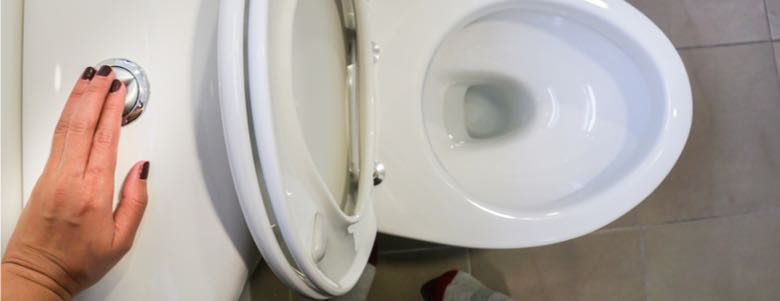
Flushing Drugs
Some medicines, such as opioids, can be especially harmful — in some cases, fatal — to others. To prevent accidental exposure or ingestion of these substances by children, pets or others, you should dispose of these medications immediately and responsibly when no longer needed.
The best option to dispose of these medications is to bring them to a drug take-back location near you. To ensure the safety of your family and pets, always keep medications out of reach in a locked medicine cabinet until you are ready to dispose of them at a local drug take-back event or at your pharmacy, hospital or health department. If a drug take-back option is not readily available, certain medications can be flushed down the toilet, according to the FDA. Check the FDA Flush List to see if your medication is one of the medications that can be flushed.
Calling this number connects you with a Drugwatch representative. We will direct you to one of our trusted legal partners for a free case review.
Drugwatch's trusted legal partners support the organization's mission to keep people safe from dangerous drugs and medical devices. For more information, visit our partners page.

